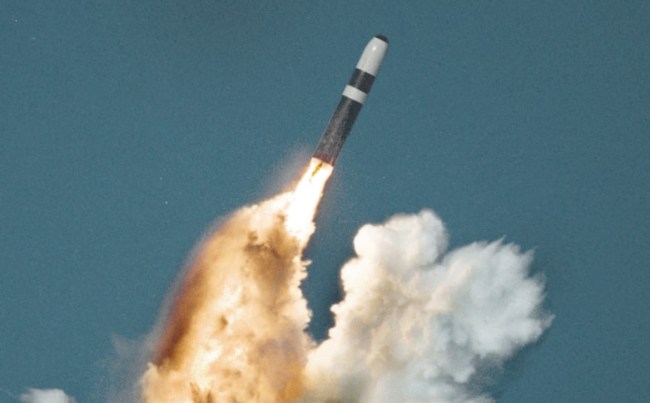Military officials in South Korea, Japan, and the United States all confirmed that North Korea launched four missiles at 7:36 a.m. Monday (5:36 p.m. Sunday ET). The banned ballistic missiles were fired from Tongchang-ri on North Korea’s east coast and three flew over 600 miles and landed in the East Sea inside Japan’s exclusive economic zone, which extends 200 nautical miles from its coastline. A spokesperson for South Korea’s Joint Chiefs of Staff said the missiles flew as high as 162 miles. A fifth missile failed to launch, a U.S. official told CNN. Experts believe that the missiles were not intercontinental ballistic missiles (ICBM), which can reach the United States.
North Korea fired four ballistic missiles this morning; they traveled almost 1,000 km towards the Sea of Japan https://t.co/8KNNUdVeos pic.twitter.com/KUYft9sdYj
— CNN International (@cnni) March 6, 2017
“The launches are clearly in violation of Security Council resolutions. It is an extremely dangerous action,” Japanese Prime Minister Shinzo Abe told his country’s parliament on Monday.
“North Korea’s nuclear and missile capabilities have really improved, and they are becoming more difficult to predict,” Abe said as reported in Bloomberg. The missiles “are getting closer to Japan’s waters and territory.”
The latest provocation by Kim Jong Un has prompted Japan to move to the highest possible alert level. This is the third time that Kim Jong Un’s missiles have fallen in Japan’s exclusive economic zone since last August.
“This is a direct challenge to the international community and a grave violation,” acting South Korean President Hwang Kyo-ahn told his nation’s National Security Council on Monday.
President Kyo-ahn also said South Korea would swiftly deploy a U.S. anti-missile defense system despite objections from China. A move that caused North Korea’s military to threaten an unspecified “counter-action” that would turn the area’s waters into a “sea of fire.”
The U.S. State Department said it was “prepared to use the full range of capabilities at our disposal against this growing threat.”
“The DPRK’s provocations only serve to increase the international community’s resolve to counter the DPRK’s prohibited weapons of mass destruction programs,” acting State Department spokesman Mark Toner said in a statement.
Geng Shuang, China’s Ministry of Foreign Affairs spokesman, said his country opposed North Korea’s launch, and said it was in violation of U.N. resolutions.
“China has also noted that the U.S. and South Korea are holding large-scale military exercises targeting North Korea,” he said. “Under current circumstances, all relevant sides should exercise restraint, and avoid actions that would provoke each other and escalate tensions.”
Many believe that the missile launch was in direct response to joint military exercises between South Korea and the United States, which North Korea sees as preparations for an invasion. The annual two-month joint-military exercise between Seoul and Washington continues through April. Last year’s joint-military exercises can be seen here.
However, Jeong Joon-hee, a spokesman for the South Korean Unification Ministry, told NBC News that Pyongyang has often fired ballistic missiles “regardless of whether we are holding regular military exercises with the U.S. or not.”
“It may look as if North Korea is responding to the ongoing S.K.-U.S. military exercise by firing missiles, but what North Korea really seems to be doing is attempting to discredit the legitimacy of our regular military exercise,” Jeong said.
Rodong Sinmun, the North Korean ruling party’s official newspaper, said that “new types of strategic weapons will soar” if Seoul and Washington continue their annual drills.
After the announcement, North Korea’s military threatened an unspecified “counter-action” that would turn the south into a “sea of fire.”
Experts say North Korea is moving at a faster rate to develop and deploy missiles.
“They did a launch a month ago, they’re now launching (more) in 30 days. That’s a third of the time they used to need,” said Carl Schuster, a professor at Hawaii Pacific University.
The potential range of North Korea's current weapons would put most of the world in reach of its nuclear warheads https://t.co/LV2qwG1qRp pic.twitter.com/bgSGWRpRdn
— The New York Times (@nytimes) March 6, 2017
[Reuters]
